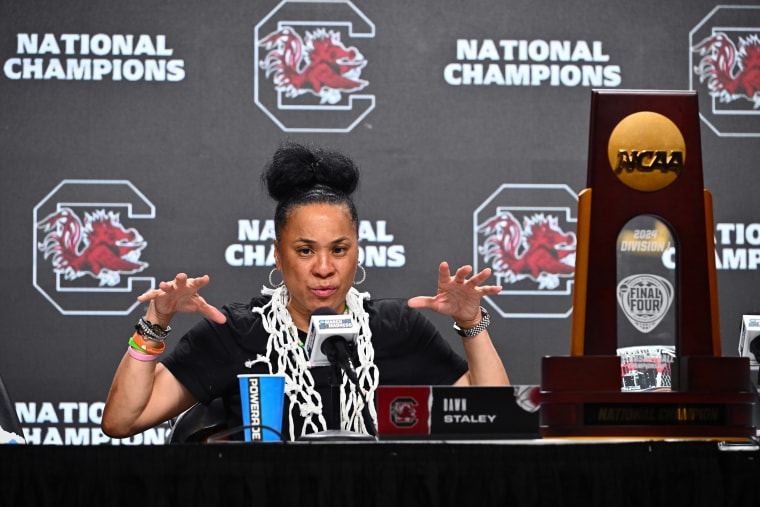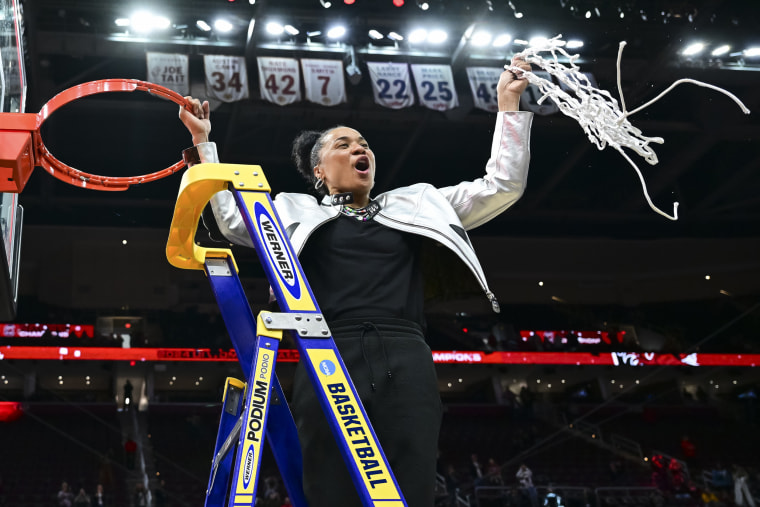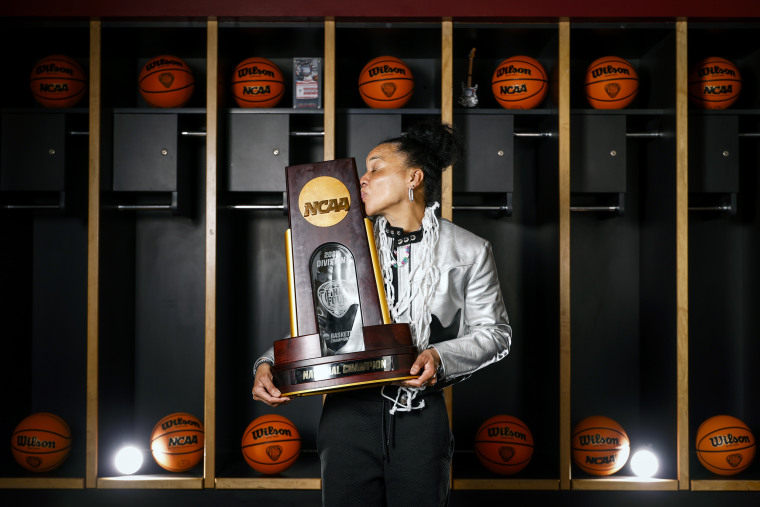This year’s NCAA women’s college basketball tournament was the most watched — and arguably the most successful — women’s college sporting event in history. Millions tuned in to see whether the South Carolina Gamecocks would achieve a perfect championship season, to see how much Iowa Hawkeyes legend Caitlin Clark would light up the scoreboard in her second straight finals appearance and whether her final college game would be a victory. But on Saturday, the eve of the national championship game, which South Carolina won 87-75, a conservative sports reporter asked South Carolina coach Dawn Staley — a legend on the court and the sideline — one of the most asinine questions possible.
Staley was asked whether trans women should be allowed to play women’s basketball.
On the eve of the national championship game, which South Carolina won 87-75, a conservative sports reporter asked Staley one of the most asinine questions possible.
There were no trans players in the next day’s championship game. There’d been no trans women in the weekend’s Final Four. In fact, there are no openly trans college basketball players in Division I women’s basketball. To call the question irrelevant is an understatement.
Outkick reporter Dan Zaksheske asked anyway. Trolling women’s sports figures about trans women has quickly become what he’s known for as a reporter.
In response, Staley answered the question straightforwardly. “I’m of the opinion that if you’re a woman you should play,” Staley said. “If you consider yourself a woman and you want to play sports, or vice versa, you should be able to play. That’s my opinion.”
Staley’s answer kicked off a predictable storm on social media, with the usual list of professional transphobes on X kicking off about it on the timeline, along with trans-supportive folks praising Staley. Staley took her place among other legends of women’s sports who openly support trans inclusion in women’s sports, including former professional basketball player Sue Bird and her wife, former U.S. women’s national soccer team legend Megan Rapinoe.

Hearing Staley so openly support the inclusion of girls like us while she was on the cusp of one of the biggest games of her career was a big boost for trans women in the U.S., who’ve taken huge political losses on this issue over the last few years.
At least 20 states have banned trans girls and women from participating on girls’ and women’s teams in K-12 and collegiate sports, including Iowa and South Carolina, the states represented in Sunday’s championship game. This despite the fact that, according to the American Civil Liberties Union of Ohio, only 34 trans athletes have ever competed in collegiate sports, which feature over half a million athletes in all sports every year.
So now the barnstorm of people are going to flood my timeline and be a distraction to me on one of the biggest days of our game. And I’m OK with that. I really am.
SOUTH CAROLINA COACH DAWN STALEY
This is the epitome of a non-issue, and yet a single man, Zaksheske, thrust this into the spotlight in the midst of a Final Four weekend that drew unprecedented attention. Whether trans girls and women should play sports may be a hot-button political issue for a small minority of people in the U.S., but Zaksheske disrespected the sport and the teams preparing for the championship game to bring it up Saturday.
Iowa coach Lisa Bluder had the right approach when she declined to answer a similar question posed to her by the same reporter. “I understand it’s a topic that people are interested in, but today my focus is on the game tomorrow, my players,” Bluder said. “It’s an important game we have tomorrow, and that’s what I want to be here to talk about, but I know it’s an important issue for another time.”
Ultimately, no matter how you feel about the issue of trans athletes in women’s sports, there’s a time and a place for questions and debates on the matter. Reporters could have asked Staley about anything, how she was planning to shut down Clark, her own legacy as a player and a coach, the history-making TV ratings this tournament pulled in.
It’s not up to Staley or Bluder to entertain the personal political obsessions of whichever reporter might be asking questions during their news conferences. Zaksheske tried to dig up controversy and put himself in the spotlight rather than allow the coaches and players to shine before the most critical game of their season.
The teams in Sunday’s final deserved better. It’s a tribute to Staley that she took such a stand. “So now the barnstorm of people are going to flood my timeline and be a distraction to me on one of the biggest days of our game,” she said at the Saturday news conference, “and I’m OK with that. I really am.”
Staley and her team didn’t let the controversy distract them. They went out and won the national title Sunday and finished the season 38-0. As a player, a coach — and now a trans ally — Dawn Staley is an absolute legend.


